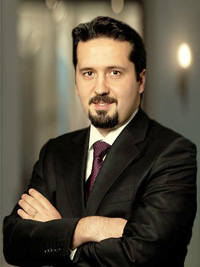“When you are an engineer, your technical knowledge degrades very rapidly. Companies have to pay a lot for training their staff. But with OCW, all the information you need is already there. It’s unbelievable.”
Ziya Deniz Eralp
 Photo courtesy of Ziya Deniz Eralp
Photo courtesy of Ziya Deniz EralpStephen Carson | MIT OpenCourseWare
Ziya Deniz Eralp’s passion for learning has allowed him to comfortably straddle the worlds of both industry and academia, and eventually move from his native Turkey to the MIT campus. His journey began at the Middle East Technical University in Ankara, where he earned an undergraduate degree in electrical engineering and a master’s degree in informatics. He went on to work for several Turkish defense technology companies, first as a systems engineer and later as a project manager, before he discovered MIT OpenCourseWare (OCW).
Deniz was thrilled to find course material within OCW that corresponded to his exact needs — it was a perfect opportunity to update his understanding of technology systems design at a key moment in his career: “In college, you take the classes to get the grades, but you don't really understand the application. When you finally need the information, you have mostly forgotten about what they taught in the class. OCW is a great way of refreshing your knowledge.”
Deniz admits with a smile that he may have gone a little overboard upon first discovering OCW on the Web. He downloaded dozens of hours of engineering and physics lectures and viewed them constantly. “It became a bit of a habit. While I was in the bus or waiting somewhere, I would watch course videos. It began to drive my wife a bit crazy because I was always watching them.”
He eventually tamed his “addiction,” but credits OCW with exposing him to several new concepts that guided his approach for designing complex defense systems: “The area that I specialize in, systems engineering and architecture, is an emerging field that has not really settled down yet. The MIT approach offers a new way that is still hard to find in books.”
Beyond his own personal education, Deniz also realized that OCW represented a cost-effective way to deliver advanced professional training. When colleagues approached with technical questions, he began recommending specific OCW lectures as tutorials: “When you are an engineer, your technical knowledge degrades very rapidly. Companies have to pay a lot for training their staff. But with OCW, all the information you need is already there. It’s unbelievable.”
In fact, OCW played an instrumental role in Deniz’ decision to attend the System Design and Management Program at MIT, where he’s currently a research assistant. His in-depth exposure to MIT’s faculty and curriculum through OCW convinced him to enroll: “I already had 10 years professional experience in industry. Most people in my position go to MBA or executive programs. But OCW gave me a clear view into the type of information that was being taught in the engineering division. I realized that it was a perfect match for my career level. Without seeing what’s inside MIT, I couldn’t have made that decision.”
Deniz is quick to note that he sees OCW as important not merely for his own career, but for anyone who wishes to expand their knowledge: “In the 21st century not many people share anything without asking for something in return. But OCW is doing exactly that. They are helping make a more educated and better world.”
We hope you’ve been inspired by this story and by OCW’s effort to meet the needs of learners eager to enhance their knowledge, lift up their communities, and change the world for the benefit of everyone. Please consider supporting our work with a donation. We’d appreciate it!